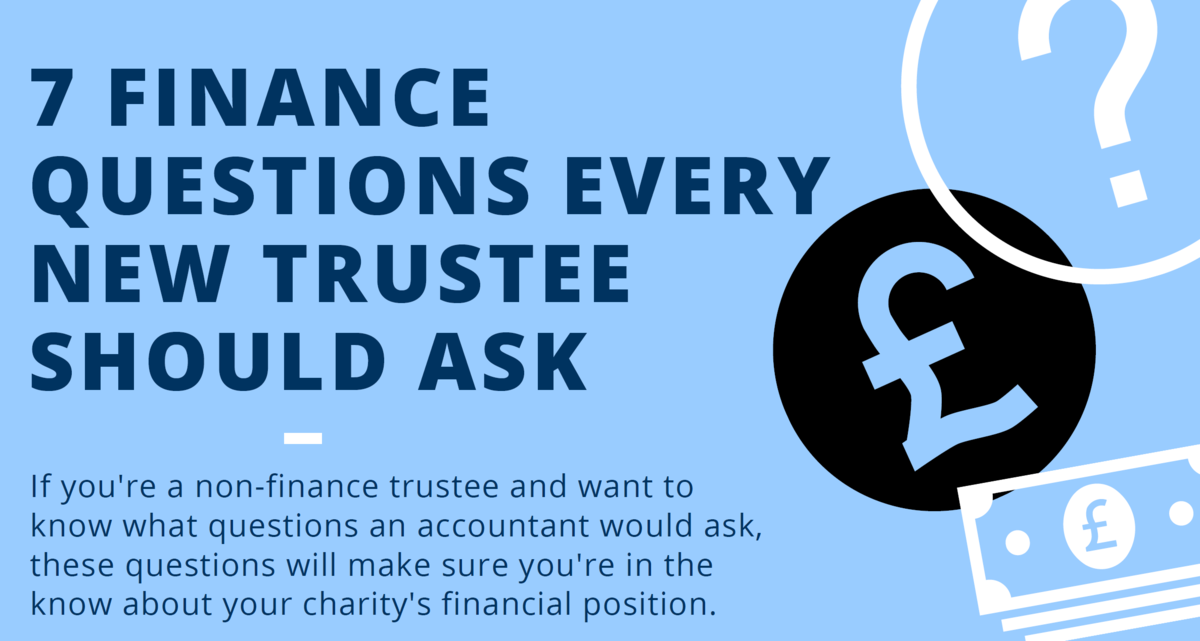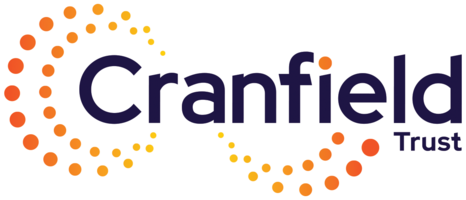As an experienced trustee I’ve been the new boy at several organisations and I have devised a few questions that let me orientate myself with my new charity.
If you are looking at a new trustee position, or even if you are already a trustee and just want to know what an accountant would ask then hopefully this post will give you a guide.
Now truthfully, many of these questions get answered in the interview or on-boarding process, but if you haven’t asked them, especially if you have been a trustee for a while then you might want to have a think about using these examples.
Question 1 – What is your cash position?

The very first question I want to know is how much money the charity has in the bank.
It’s really important that I have some comfort that the trustees or finance manager both know how much is actually in the bank and that there is a reasonable balance.
Of course, I won’t know whether a balance is reasonable until I have an answer to the next two questions!
Question 2 – What does your cashflow look like?
So, I know how much cash we have in the bank but how long will it last? The majority of charities, by their very nature are cash flow negative so what I am looking for is how long I have got before I need to start worrying about fundraising.
A group that has a £50,000 cash balance is in a really good position if their ‘cash burn rate’ is only £2,000 per month. If they are getting through £25,000 per month then we have a problem.
There’s another thing I am looking for here though; I want to know how much information my finance manager has and if they are able to produce a cash flow forecast quickly.
I’ll also want to get a sense of how financially aware my fellow trustees are. If they are on top of their numbers then it gives me a warm feeling, if they don’t know what a cashflow forecast is then I know I have some work to do.
Question 3 – What are your restricted funds?
I want to know how much of the cash that we have in the bank is available to use. Part of this is how much of the cash is restricted.
In other words, if my example organisation has £50,000 in the bank but £40,000 is restricted to capital projects, then I know that I need to pay attention to bringing in more free funds to actually run my organisation.
I also want to know how much of the cash balance is already committed.It is possible that you have a healthy bank balance but in fact, you are committed to spending a large chunk of cash on projects that are already underway.
Question 4 – Where is the money coming from?
This is important for me so that I can get a sense of how the charity finds its funds and if there are likely to be any seasonal variations.
A good example would be a charity that runs sporting events as a way of earning its money. It’s likely that the income they have will be heavily weighted towards the summer months so they’ll have plenty of cash in August but by February they will be looking pretty sorry for themselves.
Some organisations provide services that they get paid to provide, either by local authorities, the NHS or private individuals. If this is the case, I’d want to know that we understand how much they cost us to provide and what income we get as a result.
It’s distinctly possible that my new charity sells its services at a loss and makes up the shortfall through donations and grants and this is fine, but I just want to know what the loss is.
Question 5 – What are the big events that I need to know about?
When I’ve got a clear sight of the cash situation then I need to start thinking about the future.
- What big financial events do I need to know about?
- Do we pay rent on our shops or offices?
- Do we have quarterly payments to make?
- Are there big payroll commitments to meet?
- Is there a big event that we are holding that we need to finance?

Question 6 – What does your risk register look like?
The first obvious ‘sub question’ here is do they actually have a risk register?
If not then I’d be worried that the trustees don’t have a clear sight of any issues that may be bubbling under the surface that could cause problems later on.
If they do have a risk register then I would be looking at it to assess which things are the most likely to occur and which are going to have a big impact if they do turn up.
I’m less worried about things that are very unlikely to happen, and I won’t lose sleep about risks that could happen but will cost the charity £3.50 to sort out!
Question 7 – What do you want to achieve?
So much of my work as an accountant is around the forecasting function and this is where we can add real value to charities.
I want to know what things the charity wants to achieve, both in the short-term but also in the long-term.If there are some big chunky projects that are coming up then I will need to spend some time with the fundraising trustee to understand where we are getting the money from.
If there is a very large project on the horizon then I’ll probably need to be involved in the business planning process and so I want to get a heads-up as early as I possibly can to make sure that I can help to the fullest extent.
Being a trustee is about asking constructive questions
There are so many aspects of being a trustee from being a legally responsible person, providing ideas, experience and insight and also becoming that supportive and trusted friend for the management.
But in essence I’d say a really good trustee is someone who is curious and is able to ask questions in a constructive and helpful way.
Sometimes just the act of posing pertinent queries will actually cause people to think and in turn, question they way they are doing things. But on other occasions questions are needed (especially with finance) to safeguard the organisation so that it can carry on its good works.
So if you are about to become a trustee why not use these tips to give you confidence over the finances of your new charity.
Did you know we can help your charity with understanding costs, developing financial information for business planning, and improving finance processes?
Check if you're eligible for our pro bono management consultancy.
Our thanks to Stuart Walker for sharing his knowledge and expertise.
Stuart Walker MBA, ACMA, is a business writer specialising in SaaS, Fintech and Financial Services. Stuart is a Cranfield Trust volunteer based in the south west and uses his accountancy and finance expertise and skills to guide our charity clients with all aspects of financial control, planning and forecasting. View Stuart's LinkedIn profile.





